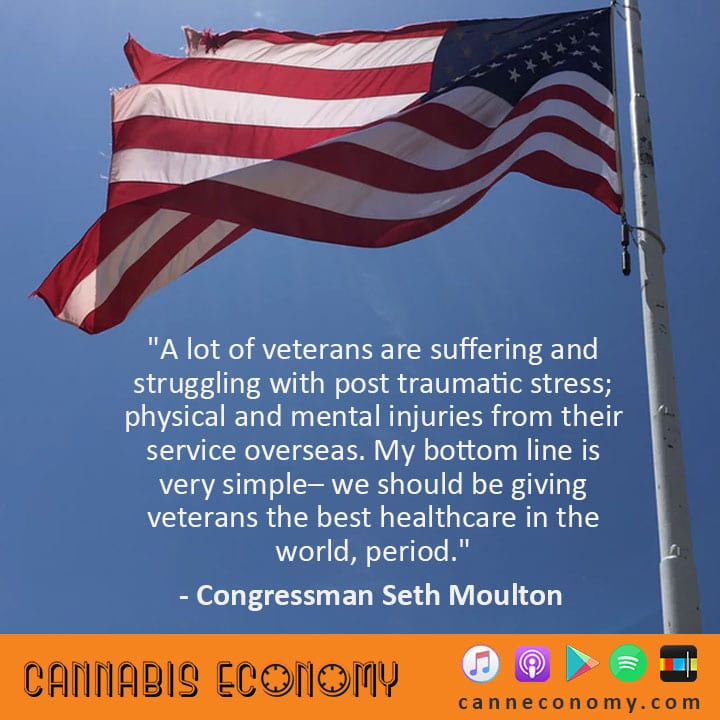
Ep. 415: US Congressman Seth Moulton
March 18, 2019Congressman Seth Moulton shares his experience as a Marine throughout the ‘90s and ‘00s and how it connects to cannabis today. Many veterans come back from service with heavy baggage, causing them to suffer physically and mentally. While cannabis can help with these problems, its legal status keeps veterans from having a conversation about it with their healthcare providers. The good news is that what was once a very partisan issue is now seeing more support from all sides, especially now that its benefits for veterans are coming to light.
Transcript:
Seth Adler: U.S. Congressman Seth Moulton joins us, welcome to Cannabis Economy, I'm your host, Seth Adler. Download episodes on canneconomy.com or wherever you currently get your podcasts. First a word from Evolab and then U.S. Congressman Seth Moulton.
Speaker 2: Top four out of five vapes in Colorado, so we can clearly say Colorado's favorite vape, Evolab obviously has a whole suite of products for fresh herbs and of course our alchemy line and Chroma. We introduced colors not too long ago, which is a flavored line of vapes. We've mastered that and we do that really, really well. So we've taken that a little bit further. We've used that technology and then we applied it to a line of products under CBX Sciences for topicals, sublinguals, and other delivery mechanisms including a line of vape of course, because we can't ignore that.
Seth Adler: Congressman Seth Moulton, love the name by the way.
Seth Moulton: Seth is a great name, at least our mothers agree on that.
Seth Adler: Absolutely. And the only difference, well there is two differences, you're a congressman, I'm not. You're a former marine, I'm not. And then everything else about us I'm sure is extremely similar.
Seth Moulton: Splitting mirror image.
Seth Adler: Exactly. Thank you very much for your service, sir.
Seth Moulton: I appreciate that, thank you.
Seth Adler: What is this that I hear about never forget versus thank you for your service? Because whenever I see someone in uniform or that I know has served, I always say thank you. What's the never forget thing?
Seth Moulton: Well I mean, they're both important. Certainly never forget what's happened in our past and the fact that there are troops out there on the front lines tonight, tomorrow, day in, day out keeping us safe. I actually just got a news alert that several American troops were killed in Syria. And I think a lot of Americans forget that we're even there. That we have troops in Syria. We still have troops in Afghanistan, the longest war in American history. That we still have troops in Iraq. And that we have troops all over Africa and Asia and around the globe who are doing important work. And they're risking their lives to try to keep us safe. So I appreciate that.
There's different debates among veterans about what the appropriate way is to thank a vet for his or her service. It's just nice to know that people appreciate it.
Seth Adler: Start with acknowledgement, choose your own adventure from there, you should be okay type of thing?
Seth Moulton: And I think also the whole point that I think most Americans agree with now that you don't have to agree with a war to appreciate the fact that someone is willing to serve. You don't have to agree with our development policy in Africa to appreciate the fact that someone is willing to go to the Peace Corps and serve there for a year.
Seth Adler: If you're going to send them you go to support them.
Seth Moulton: If they're willing to be volunteers, we need more volunteers, not fewer in America today. We need more people who believe in serving the country rather than trying to tear it apart. And if young people are willing to do that, whether it's in the military or the Peace Corps or City Year, AmeriCorps, Teach for America, whatever it is, that's great. I mean you won't find a bigger supporter of national service and getting more people to have the opportunity to serve their country than me. I think it would make us a stronger nation.
Seth Adler: Unfortunately you mentioned service members that have lost their lives in Syria today. We have an epidemic of sorts when veterans come back. The old number was 22, I think the new number is 20. What am I talking about?
Seth Moulton: You're talking about veteran suicide, which is in some ways one of the worst things that could happen. But even if a veteran doesn't get to the point of taking his or her life, they're suffering. A lot of veterans are suffering a lot of veterans are struggling with post traumatic stress, they're struggling with physical, mental injuries from their service overseas. And my bottom line is very simple. We should be giving veterans the best healthcare in the world period. That's it, no exceptions, no caveats, best healthcare in the world period.
Read the full transcript:
Become a member to access to webinars, quarterly reports, contributor columns, shows, excerpts, and complete podcast transcripts
